High School Chemistry students' scientific epistemologies and perceptions of the nature of laboratory inquiry
Abstract
This quantitative study investigated the relationship between Chemistry students' scientific epistemologies and their perceptions of the nature of laboratory inquiry. Seventy-two Advanced Level Chemistry students were surveyed. The students were sampled from twelve schools in three of Zimbabwe's nine administrative provinces. Students' scientific epistemologies were determined through a 31-item Likert-type questionnaire. Their perceptions of the nature of inquiry in A-level Chemistry laboratory work were assessed through a 25-item Likert-type questionnaire. A correlational analysis revealed a very weak relationship between students' scientific epistemologies and their perceptions of the nature of inquiry in their laboratory work. Seventy-two percent of the sampled students were found to hold largely positivistic and fairly traditional scientific epistemologies. As a group, the surveyed students were found to perceive the level of inquiry in their A-level Chemistry laboratory work to be generally low. The twelve sampled schools were reasonably homogeneous with respect to both scientific epistemologies and perceptions of the nature of laboratory inquiry. Both students' scientific epistemologies and perceptions of the nature of laboratory inquiry were found not to be related to gender. Implications for both the theory and practice of chemistry education are raised.

 Please wait while we load your content...
Please wait while we load your content...